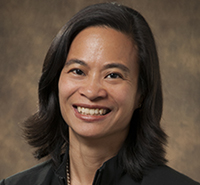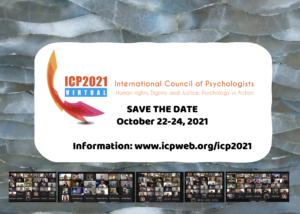
January 2021 – Volume 25, Issue 1
Editor: Stephen DiDonato
Associate Editor: Joyce Yip Green
Table of Contents
Final Message from our Past-President
Message from the President
-
Update from the Coalition for Psychology in Schools and Education (CPSE)
-
Division 52 Inside Scoop on Psi Chi Awards, Grants, and Scholarships
-
Psi Chi Welcomes New Chapters in 2020!
-
New Members Join CIRP in 2021!
-
Award for Distinguished Contributions to the International Advancement of Psychology: Sharon Horne
Global Perspectives
-
Why the Teaching of Psychology Internationally is Important
Collaborations
-
Tips on Scholarly Publishing for Psychology Faculty and Graduate Students Worldwide
- Cultivating a Meaningfulworld View with Seeds of Forgiveness: Commemorating United Nations Universal Declaration for Human Rights, and Prevention of Genocide Forgiveness: Religious Perspectives
Early Career Professionals
- Division 52 Early Career Psychologist Corner!
-
New Fellowship and Certificate Programs offered by the Center for Global Initiatives
- ATOP Meaningfulworld International Psychology Graduate Fellowship at the United Nations
Student Corner
-
Reflections at the end of 2020
-
Renewing, Regaining, and Restoring Amidst Trauma
Webinars
- Division 52 Webinar Series
Historical Perspectives
-
Silent Language: Remembering Ernst Beier
Upcoming Conferences and Events
- American Psychological Association 2021 – Division Programming Deadline Extended
International Perspectives in Psychology Brief
Note from the Editors
Art/Poetry Corner
Final Message from our Past-President
Brigitte Khoury, PhD
Dear Division 52 members,
As we near the end of the year 2020, as well as the end of my term serving you as division president, I would like to reflect on the challenging times we went through this year.
Looking back at the start of my presidency, it feels like being an anthropologist: watching a far-away society that bears so little resemblance to our own. Back in January 2020, the board and I were busy making plans, preparing for APA 2020, expand inclusion of international members into the division’s activities, and so much more.
However, with the surge of COVID-19, plans kept changing and urgent issues needed to be addressed, so we quickly had to change course to match this new reality. I am proud to say that during these stressful moments, our Division stepped up to the challenge. We started offering webinars related to COVID-19, engaged members in COVID-19 task force committees, planned special issues in the journal around this topic, and participated in international debates and exchanges with colleagues from all over the world, who were facing the same challenges, as well as coming up with solutions for various problems.
We needed to adapt and adjust quickly to a virtual convention where we all missed in person meetings and social gathering, but on the other hand gained a larger international audience. What has stood out this year was the peace vigil, initially planned to be live from the Jibran Khalil Jibran memorial garden in Washington DC. It turned out to be a rich program of readings, music and images, which although virtual, touched attendees with its message of peace uniting us and transcending all differences.
It was a challenging year, and it was a great year, with many lessons learned. I am proud that I was able to lead the division in all its successful activities. This was possible with the work and support of the board members who had the division’s best interest as heart.
I am leaving the leadership of the division in the capable hands of Dr. Larry Gerstein who will lead Division 52 with energy and will bring in new ideas and initiatives into hopefully a post-pandemic era.
 Message from our President
Message from our President
Lawrence H. Gerstein, PhD
Dear Division 52 members,
None of us expected the upheaval in our civilization in 2020. COVID-19, political, social, and economic polarization and inequities, and racial and ethnic injustice, and many other developments have touched everyone in profound and disturbing ways. The extent of societal suffering, selfishness among our government officials, and blatant dismissal of science challenges us to step up, mobilize, and implement policies, procedures, and structures to enhance our quality of life. 2020 has shattered the veil of independence and revealed that interdependence is inherent to our existence as a species, and also offers our countries a framework to potentially peacefully co-exist and thrive.
Embracing interdependence is critical to the evolution of the globalization of psychology and the maturation and effectiveness of our Division as well. We must deconstruct the Euro-U.S. centric paradigm of psychology, and more intentionally and forcefully pursue, respect, and integrate indigenous forms of psychological science, theory, practice, and training represented worldwide. Division 52 has made significant strides in contributing to this outcome. 2020 has taught us we must do more, and be more strategic in our actions!
I have already launched two new Division committees (Global Health; Practice) and will propose another (Science), each with a mandate, in part, to confront and dismantle the Euro-U.S. centric paradigm of psychology, to recruit and secure members from multiple countries, and to pursue models of psychology that are cross-culturally valid and relevant. I also will initiate a leadership academy to prepare students and Early Career Psychologists (ECPs) for leadership positions in our Division and other organizations. Additionally, I intend to implement strategies and structures to recruit and retain a larger number of students and ECPs from around the globe. Further, I will continue to prioritize how Division 52 can enhance and protect individuals’ quality of life during the pandemics subsuming our planet. Finally, I will invest in opportunities to promote and expand the use of peacebuilding, conflict prevention and resolution, and de-escalation skills. Right now, we need many more “bridge builders” worldwide!
Like a number of you, I’m drained, disappointed, confused, angry, and fearful. I’m also longing to travel again, ANYWHERE. I’m extremely thankful to my wife, family, friends, and colleagues for your support in 2020. I’m so grateful for the wisdom, encouragement, and friendship of Brigitte Khoury, Nancy Sidun, Merry Bullock, Falu Rami, Changming Duan, Yamini Bellare, the Co-Chairs of the 52 COVID-19 Subgroups, our Board members, and previous Presidents of 52. Finally, I remain hopefully that innovative solutions will continue to emerge in the midst of this challenging time. I know our Division will assist creating such solutions. I’m honored to serve you and welcome your involvement in the initiatives I mentioned earlier and other ways you want to contribute to our Division. Wishing you a happy, healthy, and peaceful New Year!
Update from the Coalition for Psychology in Schools and Education (CPSE)
Patricia H. A. Perez, PhD;
Division 52 Representative
Associate Professor, International Psychology,
The Chicago School of Professional Psychology, Online Campus
The Coalition for Psychology in Schools and Education (CPSE) includes members who represent various APA divisions. I am pleased to be the Division 52 representative since December 2019. CPSE’s mission “is to bring together interested psychologists to promote and make publicly accessible applications of the research that psychology has developed to assist the nation in improving the quality of public and private pre-K to 12 education” (https://www.apa.org/ed/schools/coalition).
As a group, our meetings are in Washington, DC semi-annually (June and December). Since 2019, I have participated in three meetings, one in-person (December 2019) and two virtually (June and December 2020). Our last meeting was held on December 4-5, 2020. We continue to make good progress on our projects with much focus on racial and educational disparities, technological barriers/challenges, Diversity/Equity/Inclusion considerations, and impact of COVID-19 on teachers and student learning. Please see the projects I continue to participate in.
Mental Health Primers: This working group was launched in 2018. These primers assist teachers with relevant research and strategies for addressing mental health issues of their students. I am currently in a working group to develop a primer for children in special education. Please see completed mental health primers here: https://www.apa.org/ed/schools/primer.
Recommendations on Starting School During the COVID-19 Pandemic Report: Along with some Coalition colleagues, I was invited to be a contributor on this report as a guide for educational leadership, teachers, parents, caregivers, and specialists due to the COVID-19 pandemic. Please see the report here: https://www.apa.org/ed/schools/teaching-learning/recommendations-starting-school-covid-19.pdf.
Our next meeting is scheduled virtually on June 4-5, 2021. In addition to moving forward with our existing projects, we will continue to discuss the impact of the COVID-19 pandemic on teaching and learning with diverse and marginalized groups.
If you are interested in learning more about CPSE and our work, please feel free to contact me at pperez@thechicagoschool.edu.
Division 52 Inside Scoop on Psi Chi Awards, Grants, and Scholarships
Martha S. Zlokovich, PhD and Daniel Balva, M.S., NCC, CRC
For this edition of the IPB, we wanted to highlight some important student funding opportunities by a great organization that often works in collaboration with Division 52, and always places student needs at the forefront: Psi Chi, the International Honor Society in Psychology.
Over the last few years, Psi Chi has made about $400,000 in awards, grants, and scholarships available to members annually. For the current academic year, however, the Board reduced the total due to the impact of the pandemic on the economy and on conference travel. Nevertheless, Psi Chi members may apply for scholarships, awards, and grants to support their studies, research projects, or travel to psychology conferences to present research – during the pandemic travel grants may be used to pay virtual conference registration fees.
Research awards are available to members who submit research projects to the Psi Chi program at the six regional conventions in the US, and at APA and APS conventions. Online presentations of student research at regional and APS conventions is available on the Open Science Framework in the Psi Chi Research Poster & Paper Repository, https://osf.io/u6rn9/.
Some research grants support particular topics, such as the Mamie Phipps Clark research grants for work on diversity topics, and the Psi Chi/Robert Cialdini Undergraduate Research Grant for Field Research in Social Psychology. Dr. Cialdini has extended field research to include online projects while COVID-19 limits other forms of field research. Psi Chi also gives two annual diversity research awards, one for an article published in the Psi Chi Journal of Psychological Research and one in the Eye on Psi Chi magazine.
Students and faculty may only join Psi Chi through a chapter on their own university campus – and there are 24 chapters outside the US 50 states, located in 14 different countries and three U.S. territories. For Division 52 members who are at a campus with a chapter, joining Psi Chi opens opportunities for them to apply for these benefits. Furthermore, once people join Psi Chi, they become lifetime members. This means they will be eligible to apply for Psi Chi awards, grants, and scholarships if they move to another university – any university in the world – regardless of whether their new university has a chapter of Psi Chi. Of course, if it doesn’t have a chapter, they could encourage their new campus to apply for one!
Members can search for awards, grants, and scholarships on Psi Chi’s website, www.psichi.org, by clicking on the AWARDS/GRANTS tab and picking the dropdown category that best applies to them – undergraduate student, graduate student, or faculty [instructor/professor] member. We also have chapter awards and grants. Only undergraduate and graduate students may apply for one of 16 annual $3,000 scholarships.
Some applications are only open once per year, while others have two or three rounds of funding per year. We recommend exploring the website and noting upcoming submission deadlines.
For Division 52 members, it is important to know that Psi Chi’s mission is recognizing and promoting excellence in the science and application of psychology. In addition, it is important to know that Psi Chi supports this mission not only through the work of the Board of Directors and staff, but also through three advisory committees, each chaired by a director. Dr. Brien Ashdown just started as Psi Chi’s first International Director January 2020, leading the International Advisory Committee. Anyone teaching or studying at a university outside the 50 states who is interested in applying for a chapter is encouraged to contact Dr. Ashdown.
Division 52 members may also be interested in our Research Advisory Committee, Diversity Advisory Committee, and new Faculty Support Committee. We are current searching for our first Faculty Support Director.
Most important to know? It is certain you will not receive a Psi Chi award, grant, or scholarship if you don’t apply – so we highly recommend that you take advantage of these great funding opportunities and apply!
Psi Chi Welcomes New Chapters in 2020!
Psi Chi, the International Honor Society in Psychology, has welcomed many new chapters from outside the USA’s 50 states during the past year. We are excited to have the following chapters join the global Psi Chi family:
- American University of Sharjah (United Arab Emirates)
- University of Lincoln (United Kingdom)
- Universitá Cattolica del Sacro Cuore (Italy)
- Nnamdi Azikiwe University Awka (Nigeria)
- Ozyegin University (Turkey)
Psi Chi is committed to increasing our global membership, and fostering meaningful engagement among our many chapters around the world. If you are interested in establishing a chapter of Psi Chi or would like more information, please contact the International Director, Brien K. Ashdown, at international.director@psichi.org.
New Members Join CIRP in 2021!
APA’s Committee on International Relations in Psychology (CIRP) would like to thank Jill Betz Bloom (William James College and 2020 CIRP Co-chair), Nancy Diehl (International School, WBAIS) and Elizabeth Terrazas-Carrillo (Texas A&M International University) for their three years of service on the committee (2018-2020). CIRP is excited to welcome Sheena M. Walker (University of the Virgin Islands), Hana Suzuki (Ritsumeikan University), and Linda M. Woolf (Webster University), who will begin their three-year term on the committee in 2021.
The mission of APA’s Committee on International Relations in Psychology is to foster interactions of all kinds between psychologists in the U.S. and their colleagues abroad, to promote an international perspective within psychology, to promote the role of psychology within international program, policy and educational settings, and to monitor the rights of psychologists and the use of psychological knowledge internationally. CIRP accomplishes this mission through a variety of programs and activities. You can learn more at www.apa.org/international/governance/cirp or by contacting the 2021 CIRP chair, Brien K. Ashdown, at ashdown@hws.edu.
Award for Distinguished Contributions to the International Advancement of Psychology
Sharon Horne
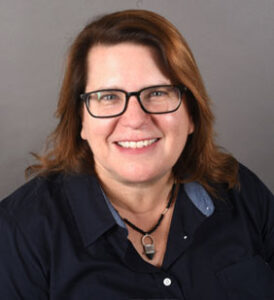
Why the Teaching of Psychology Internationally is Important
Bruce B Svare, Ph.D
Department of Psychology
State University of New York at Albany
Globalization and the world-wide growth of the discipline of psychology demands that faculty become engaged in teaching internationally. The benefits of teaching psychology internationally are significant for faculty, students and universities. They can have far reaching influences on curriculum, faculty and student development and university missions. However, there are significant impediments to teaching internationally which need to be addressed by the higher education community. The benefits of teaching internationally as well as the impediments to its continued growth are discussed here. The link to the full paper is provided below.
The world-wide growth of psychology. Psychology in the United States is as popular as ever with about 1.5 million college students registering for introductory psychology annually and about 100,000 students earning their undergraduate degree in the discipline each year (Gurung, Hackathorn, Enns, Frantz, Cacioppo, Loop, & Freeman, 2016; Norcross Hailstork, Aiken, Pfund, Stamm & Christides, 2016). Additionally, psychology courses are routinely taught in American high schools. Approximately 1,000,000 US high school students annually finish a psychology course (APA, 2013), and over 293,000 high school students took the advanced placement exam in psychology in 2016 (College Board, 2016). These figures have dramatically escalated in the last two decades and indicate a strong interest and demand for the discipline of psychology among our youths.
Given its popularity in the US, it should come as no surprise that psychology has been growing exponentially throughout the rest of the world (Takooshian et al., 2016). As recently as the 1980s, US psychologists accounted for an estimated 80% of the total worldwide (Rosenzweig, 1984). That percentage is now only about 24% (Zoma & Gielen, 2015). While licensing standards vary greatly from one country to another, (for example, some countries require only an undergraduate degree while others require a master’s or a Ph.D.) (Takooshian, Gielen, Plous, Rich & Velayo, 2016), there is an estimated 1,000,000 practicing psychologists in the world today (Zoma & Gielen, 2015).
Editors Note: This brief is being published as a primer for Dr. Svare manuscript which was unintentionally not published in a prior issue of IPB, as promised by the editorial team, prior to the IPB changing the vision of the IPB.
Please click the link below to read Dr. Svare full manuscript:
Svare – Why the Teaching of Psychology Internationally is Important – Full Manuscript
Tips on Scholarly Publishing for Psychology Faculty and Graduate Students Worldwide
Bruce B. Svare, State University of New York at Albany, Albany, New York USA
Rana Pongruegphant, Sirintorn Thepmongkorn and Thaksaorn Srisangkhajorn;
Burapha University; Bang Saen, Thailand
Dissaya Pornpattananangkul and Watcharaporn Boonyasiriwat; Chulalongkorn
University; Bangkok, Thailand
Passagorn Tevichapong; Chiang Mai University; Chiang Mai, Thailand
Warangkana Ratchatawan; Ratchasuda College; Sala, Thailand
Loan Nguyen; Hoa Sen University; Ho Chi Minh City, Vietnam
Laurene Chua-Garcia and Melissa Lopez Reyes; De La Salle University; Manila, Philippines
The worldwide growth of psychology has been explosive in the last 40 years (Takooshian, Gielen, Plous, Rich and Velayo, 2016). As recently as the 1980s, US psychologists accounted for an estimated 80% of the total worldwide (Rosenzweig, 1984). That percentage is now only about 24% (Zoma & Gielen, 2015). While licensing standards vary greatly from one country to another, (for example, some countries require only an undergraduate degree while others require a master’s or a Ph.D.) (Takooshian et al., 2016), there is an estimated 1,000,000 practicing psychologists in the world today (Zoma & Gielen, 2015).
The growth of the discipline of psychology is also reflected in the dramatic increase in the number of psychology journals and the commensurate increase in the number of published articles. PsychINFO, the major source of information on psychology journals (APA, 2017) shows that there are close to 2,500 journals in our discipline today with over 100,000 articles published in 2016. In 1950, there were less than 20 journals and only 391 articles. Publications now come from 50 countries and are written in 29 different languages with English the predominant language. In addition, psychology publications represent 22 major categories and 135 subcategories. As a further measure of the growth of psychology and the internationalization of the discipline, recent research shows that international authors are publishing in American psychology journals with increasing frequency and US and non-US authors are collaborating more on multi-author papers (Piocuda, Smyers, Knyshev, Harris and Rai, 2015).
Promoting good scholarly writing habits among faculty and students is an essential requirement in higher education worldwide. In the field of psychology, like other disciplines, there is intense pressure to publish original work in high prestige journals. This is fueled to a large extent by the competition among universities for world rankings. The explosive growth of psychology worldwide in the last 50 years and the resulting increase in scholarship associated with that growth, calls for continuing efforts to educate faculty, professionals and students in how to properly execute a scholarly paper and get it published. This is especially important in developing countries where many psychology faculty either have not experienced appropriate mentoring in their training and/or lack the time and resources to become more fully engaged in scholarly publishing. The purpose of this paper is to provide a basic framework for understanding the writing and publishing process, especially for those from other countries who are relatively new to it, and to offer specific advice on how authors can maximize their chances of getting their work published. Another goal of this paper is to explain world university ranking systems and how they are impacting faculty scholarship worldwide.
If readers would like to read more of this global teams tips on publishing worldwide, please click the link below:
Cultivating a Meaningfulworld View with Seeds of Forgiveness
Commemorating United Nations Universal Declaration for Human Rights,
and Prevention of Genocide Forgiveness: Religious Perspectives
Rachel Davidovich, Josiah Taylor, & Dr. Ani Kalayjian
New York City
December is an important month for the United Nations and the international community. It is not only the end of the year but an opportunity for reflection. One crucial historical moment that the international community observes is the United Nations General Assembly in Paris passing the Universal Declaration of Human Rights (UDHR) which established basic human rights protections for all individuals, and created a common human rights standard for all nations. This was the first act of its kind. Prior to the UDHR, human rights were not defined and there weren’t international systems in place to ensure that basic human rights, as outlined in Human Rights Declaration, were protected.
“The peoples of the United Nations have in the Charter reaffirmed their faith in fundamental human rights, in the dignity and worth of the human person and in the equal rights of men and women and have determined to promote social progress and better standards of life in larger freedom.” (Universal Declaration of Human Rights)
The implementation of the UDHR led to a 72-year struggle, where the United Nations worked towards expanding its reach and working to end genocide around the world. In celebration of the 72nd anniversary of the UDHR, ATOP Meaningfulworld in collaboration with the United Nations conducted a panel discussion with six different religious leaders to discuss their religious perspectives on forgiveness. Forgiveness is rooted in trust, empathy and an understanding of the commonality among humans. These are values that are imperative to developing societies that are open, transparent, charitable and embracing of human rights.
In addition, on 11 September 2015, the UN General Assembly passed Resolution 69/323, where they designated the 9th of December as the International Day of Commemoration and Dignity for the Victims of the Crime of Genocide. The creation of International Day provides an opportunity for remembrance and also to raise awareness about the crime of genocide and advancing prevention efforts. Although, International Day has been in existence for five years and events have happened to raise awareness and prevention efforts, crimes against humanity such as war crimes, genocide, and mass atrocities continue to occur. As a result, the UN General Assembly called on mass media to shape the public perception of the risk of atrocity crimes and contributing to genocide prevention. The public is largely swayed by the media. In order to advance genocide prevention efforts, there needs to be a strong presence and representative civil society with a free and independent media to raise awareness of genocides happening around the world. In 2019, the United Nations Strategy and Plan of Action on Hate Speech was launched to address the spread of discriminatory, hostile and violent messages. There are various forms of hate speech and intolerance that can lead to crimes. Human rights communications, and humanitarian agendas have to be bridged. The United Nations is planning to set up events that will allow mass media organizations to get involved in addressing and preventing atrocities and the crime of genocide.
The tragedies of the Holocaust and Second World War sparked a movement by humanitarian, political and international leaders to ensure that humans would not repeat those atrocities again. The UN adopted the Genocide Convention of 1948. The Genocide Convention of 1948 is a global treaty among 152 states, as of today that bound states to the following obligations regarding genocide. They agree “not to commit genocide…punish genocide… enact the necessary legislation to give effect to the provisions of the Convention… [and]ensure that effective penalties are provided for persons found guilty.” The treaty had a powerful effect and became a norm in international customary law, thereby binding all nations to its articles, regardless of whether or not they participated in the convention. While the convention was a significant stride in genocide prevention, genocide still occurs in the world. The United Nations Secretary-General, Antonio Guterres stated that “genocide is never committed without clear, multiple warning signs. The victims are often early targets of hate speech, discrimination, and violence.” Some examples are the Ottoman Turkish Genocide of the Armenians & other Christian minorities, the Cambodian Genocide, the Rwandan Genocide, the Bosnian Genocide, and the recent Azeri and Turkish genocide of Armenian in Artsakh. In each of these cases before the genocide occurred, hatred and fear were disseminated among the country focusing on differences between the majority or minority groups.
In Commemoration of the United Nations’ International Day for the Universal Declaration of Human Rights & the 72nd Anniversary of the adoption the 1948 Genocide Convention on raising awareness and prevention efforts, ATOP MeaningfulWorld coordinated a panel discussion on forgiveness as it is vital aspect of human rights and preventing genocide. The panel included six religious leaders sharing perspective on forgiveness from their religion.
The panelists included:
- Rabbi Joshua Davidson of Temple Emanuel, (Jewish faith)
- Chief Abbot Bante Heenbunne Kondanna of Staten Island Buddhist viharaya (Buddhist faith)
- Reverend Louise Kalemkerian of St. Paul’s Episcopal Church, (Christian faith)
- H. Guru Dileepji Maharaj from the Global Council of Hindu Leaders, (Hindu faith)
- Mohammad Quatanani from the Islamic Center of Passaic County, (Islam faith)
- Bhai Sahib Sucha Singh from the tri-state Sikh Cultural Society (Sikh faith)
The conference sought to bring awareness on the different religious perspectives on the importance of forgiveness; to find commonality among different religions; and the importance of empathy, and love for each other through forgiveness. The panel discussion began with Ms. Lorraine Simmonsolding a moment of silence in honor of human rights, honoring all those who perished. Then Dr. Ani Kalayjian, President of ATOP MeaningfulWorld read a poem about forgiveness; here is a short sentence:
Forgiving means freeing oneself
of the chains of anger,
unlocking the locks of resentment, and
undoing the cycles of hatred….
Dr. Kalayjian moderated the panel and asked each of the panelists the same two questions. These questions centered upon each panelist’s respective religion and understanding of the concept of forgiveness.
Q 1: Briefly explain forgiveness from your religious perspective, and the principles of forgiveness?
Panelists focused unanimously that forgiveness was reinforced in their religion. They reinforced the notion of ‘we are all human, and we make mistakes. Reverend Kalemkerian of the Episcopal Church said, “Jesus is the ultimate model of forgiveness, I am loved.” Bhai Singh, representing the Sikh religion stated that “rather than looking at the differences, let’s look at the similarities. We have more similarities than differences. If we are all children of God and He sees no differences, why should we? Forgiveness is active, it requires practice.” Chief Kondanna explained the Buddhist approach, “Practice love, kindness, compassion, altruism, and joy.” Rabbi Davidson spoke of the concept of tshuvah, “How many of us have nurtured individual resentments for times we have felt sacrificed at the altar of someone else’s needs…but forgiveness is not for the benefit of others but for ourselves.” Guru Maharaj of the Hindu faith shared “Forgiveness is one of the six cardinal virtues in Hindu dharma…incorporating the concepts of mercifulness, gratitude, empathy, unbiasedness and one who does not cause any fear.” Dr. Quatanani of the Muslim faith iterated, “All son of Adam I shall forgive so long as you pray to me…I do not care if your sins pile up the sky’s, I will forgive you if you come to me…God wants to forgive us; you just have to ask.”
Q 2: What are the challenges you have found when practicing forgiveness within your congregation?
Such an inquiry allowed for the realization of another commonality, despite differences in religions, people struggle with practicing forgiveness in a similar manner. Rabbi Davidson stated “those who have trouble rising above the most painful moments, the challenge is to try to see the light when you’re surrounded by darkness. If you can’t see your life as improving, you can’t take those steps. Anger and resentment are powerful. Don’t just be survivors but enjoy life to the fullest.” Reverend Kalemkerian said “sometimes we do not see the wrongs that we have done towards others… we forget that people walk through life with troubles of their own.” Guru Maharaj mentioned that “lack of understanding of our existence and universal consciousness, we were all chosen to be on this Earth and have to respect each other, acknowledge we have a short life to celebrate our existence.” Dr. Quatanani explained “emotions are a challenge that cause misunderstanding …we need to tell our people that faith is not enough, discipline is needed.” Bhai Singh said “there are five challenges in Sikhism, mercy, discipline, courage, power and oneness…many people get stuck on the first step, not being merciful, and do not have discipline in their lives.” He continued to explain that forgiveness is an ongoing practice, and that “one of our remaining challenges…is to promptly recognize and act on warning signs.”
Closing Prayers
Finally, Dr. Kalayjian asked each leader to say a prayer on forgiveness. Each leader shared a powerful prayer expressing their intention for everyone to experience true forgiveness. This was a powerful moment for people of different religious beliefs to join their efforts and express love, empathy, and forgiveness. Religious leaders and civil society have a key role to play in preventing crimes against humanity and violate human rights. The panelists expressed their desire to see every person, regardless of race or religion, to be able to give and receive forgiveness. Everyone is deserving of love, healing, human rights, and forgiveness. The International Day of forgiveness program proved to be healing, educational, and transformative.
Early Career Psychology (ECP) Corner!
2020, thanks for the lessons! You were a trying year –to say the least– that tested each of us personally in one way or another. Yet, 2020 helped us understand that to placate and ultimately end the pandemic, we need not to operate as individuals, independent families, self- reliant communities, or isolated countries. COVID-19 called us to comprehend that to succeed, we need to start thinking and functioning globally, as one. It is with that sentiment in mind, so relevant for our division, that on behalf of our ECP Committee, we wish each of you:
A Happy & Prosperous New Year
Bonne Année – ¡Feliz Año Nuevo!
Blwyddyn Newydd Dda – Buon anno – Frohes Neues Jahr.
Gelukkig Nieuwjaar – Gleðilegt nýtt ár – あけましておめでとう
Xin Nian Kuai Le – 0 San Nin Fai Lok – Mutlu yıllar Czech – Sťastný nový rok
Godt nytår – Hyvää uutta vuotta – Godt nytt år
Szczesliwego Nowego Roku – Feliz Ano Novo – S novym godom
With renewed hope, energy, and enthusiasm, our ECP committee would like to start the year listening to your suggestions, ideas, and/or concerns to support you as an existing ECP member and recruit new ones both locally and internationally. Within the Division’s 52 website (https://div52.net/ecps/), our section is under construction and we are eager to include information and resources that would be of value to you. We have learned that prior to the pandemic, we tended to underestimated our capacity and efficacy in organizing meetings and events remotely. Thus, with the experienced gained in 2020, we intend to revitalize our activities and we invite you to be an active part of this process. Please feel free to email to any of us within our executive committee: javaldivia@TEC.MX, cristcru@gse.upenn.edu, and LErickson@johnsonu.edu.
 With the beginning of the year, Dr. Juan Antonio Vazquez will assume the role of Chair of the ECP Committee. We are lucky to have you as our new leader! As a past Chair, I will support his initiatives and those of our new Chair Elect, Dr. Lora. Erickson.
With the beginning of the year, Dr. Juan Antonio Vazquez will assume the role of Chair of the ECP Committee. We are lucky to have you as our new leader! As a past Chair, I will support his initiatives and those of our new Chair Elect, Dr. Lora. Erickson.
Welcome Dr. Erickson!
 “Dr. Erickson is a licensed clinical mental health counselor in Illinois and Florida and associate professor of social and behavior sciences at Johnson University in Kissimmee. She is a telehealth therapist for BetterHelp, a virtual counseling platform that allows her to see clients in the U.S. and internationally. She also serves as an adjunct instructor for The Chicago School of Professional Psychology in the graduate international psychology program and Los Angeles Pacific University in undergraduate and graduate applied psychology programs. She is a subject matter expert in assessment, diversity, and ethics. She is also a member of the Institutional Review Board with Johnson University. Her clinical interests include work with children, adolescents, and young adults particularly in foster care and with histories of trauma. Her research interests include the cross-cultural study of resiliency and protective factors, particularly among youths and young adults with histories of system-based care, emergent professional identity models within the field of international psychology and related disciplines, as well as the sensitivity of qualitative methodology in trauma-based work.” From https://div52.net/about/board-of-directors/
“Dr. Erickson is a licensed clinical mental health counselor in Illinois and Florida and associate professor of social and behavior sciences at Johnson University in Kissimmee. She is a telehealth therapist for BetterHelp, a virtual counseling platform that allows her to see clients in the U.S. and internationally. She also serves as an adjunct instructor for The Chicago School of Professional Psychology in the graduate international psychology program and Los Angeles Pacific University in undergraduate and graduate applied psychology programs. She is a subject matter expert in assessment, diversity, and ethics. She is also a member of the Institutional Review Board with Johnson University. Her clinical interests include work with children, adolescents, and young adults particularly in foster care and with histories of trauma. Her research interests include the cross-cultural study of resiliency and protective factors, particularly among youths and young adults with histories of system-based care, emergent professional identity models within the field of international psychology and related disciplines, as well as the sensitivity of qualitative methodology in trauma-based work.” From https://div52.net/about/board-of-directors/
Again, wishing you and yours a safe, healthy, and prosperous 2021!
Dr. M. Cristina Cruza-Guet, PhD, MEd (ECP – Past Chair)
New Fellowship and Certificate Programs offered by the
Center for Global Initiatives

Fellowship and Certification Programs
The Center for Global Initiatives is proud to announce its new Fellowship and Certification Programs in Humanitarian Intervention and Global Health. We’ve partnered to develop a Consortium of top universities, medical schools, and international NGOs. Take a Worldclass Master Class, to learn more, please see: http://www.alifeinfull.org/courseworks.html where we opensource humanitarian work.
ATOP Meaningfulworld International Psychology Graduate Fellowship at the United Nations
This is a unique, one of a kind, part time opportunity to expand your experience in International Psychology, Global Humanitarian Relief, Human Rights and Policy Development.
The purpose of this graduate fellowship is to provide fellows with international psychology experience, through work with refugees and migration, policy development, human rights, preventing genocide, building partnerships, and working on Sustainable Development Goals within the United Nations.
Description of Experience: This fellowship is a one-year part-time, volunteer experience, (12 hours per week). Fellows spend Thursdays at the United Nations (UN) pandemic permitting. The remainder of their time is spent remotely reviewing literature, researching topics related to international psychology, developing, and revising policies, and assisting with Meaningfulworld’s outreach efforts. Fellows are invited to our annual international humanitarian missions, each lasting approximately two weeks; fellows are responsible for funding their own participation in these missions. Fellows have the option of reapplying at the end of their fellowship year and completing a second year in a leadership role. This fellowship will provide experience in conflict transformation, working with refugees, and addressing migration challenges. Fellowship consist of three tracks: Human Rights, Policy Revision, and Humanitarian Relief, or integrating all three.
Eligibility: Applicants must meet the following requirements: • Have a master’s or doctoral degree in clinical psychology, counseling psychology, conflict resolution, social work, psychiatric nursing, medicine, law, or a related field • Have availability every Thursday to attend meetings at the United Nations and have availability of another 6 hours per week to work remotely • Possess at least a basic knowledge of international relations, or international psychology, and a dedication to humanitarianism • Possess strong written and oral communication skills • Can travel abroad, (if choosing Humanitarian path) including possession of a valid passport (Travels permitting during pandemics)
How to Apply: Applications must include: ➢ An updated curriculum vita ➢ A transcript from the institution where you earned your highest degree ➢ A statement of interest not to exceed 500 words that explains your interest in international psychology, global humanitarianism, human rights, refugees and migration, and policy development (your statement should also include a description of what you hope to gain from this experience, and which track you are interested in completing)
➢ Three references: include contact and relationship information.
To apply, please email your application materials to Dr. Ani Kalayjian, at Drkalayjian@meaningfulworld.com, or info@Meaningfulworld.com.
Kindly visit www.meaningfulworld.com
Reflections at the end of 2020
Ankita Nikalje
Div. 52 Student Chair 2020
As I reflect on my term as the Student-Chair of Div. 52, to say it has been a tough year would be an understatement. Between the grief, isolation, fatigue, pain, and loss there have been deeper moments of self-reflection. For someone like me who thrives on busy-ness, deadlines, and capitalism-fuelled-work culture, slowing down, pausing, and not-doing left me in a state of loss, lack of motivation, and confusion. As a graduate student in a doctoral program and in a position of leadership, this lack of motivation was jarring and unknown. I recognized that for the past 4 years of my graduate program, I had truly worked non-stop, ignored self-care, and pushed from one deadline to another.
After a long moment of fighting myself to work at my same pace, I was forced to take a moment to pause and know myself wholly and fully. In exploring my own self, in my limitations and resilience, I recognized this year as a moment, a process, to be okay with what I have. To know my limitations and allow my body to guide me to do what was best for me, which was to pause, to breathe, to just look after myself, my friends, and my family. This year you did not see any student programming, you did not see me. Though a part of me wants to apologize, I am intentionally choosing not to. I hope you can all recognize that while there was a lot to do, there was very little I had to offer. For myself, my health, my wellbeing and those who I care for and love, I needed to pause.
I invite you all, as students, educators, practitioners, people to reflect on this moment of shared global humanity, to indulge in practices of self-kindness, and mindfully explore your being, your body, and yourself. I hope you have all taken moments to pause, to be, and to be gentle with yourself.
Finally, I would like to introduce Daniel Balva who will start his term as the Div. 52 Student Chair for the upcoming year. Please feel free to contact Daniel at daniel.balva@uga.edu to learn about opportunities to get involved with Div. 52 student committee.
In peace, solidarity, and love,
Ankita
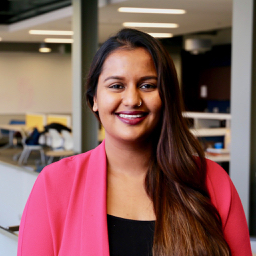

Ankita Nikalje Daniel Balva
Renewing, Regaining, and Restoring Amidst Trauma
By: Lisseth London, CEO of Lisseth London Global Consulting, LLC 
At a time where we usually have hope and plans for the new year, as a society we are struggling to find that piece of thread between the expected and reality. It is no surprise that 2020 was a year where many were tested physically, spiritually, emotionally, and economically. During the holiday season, many have wondered how to recreate years of happy traditions in a world where social distancing is still blatantly present.
Despite of what we feel or the restrictions we are all facing, holding on to hope for a better tomorrow has never been more important. The year 2021 will not be welcomed with expectations or requirements but more of a reminder to enjoy every moment. Though 2020 had been a traumatic year, I am excited to see that as a society who has acknowledged the barriers they are still facing, such as racial discrimination, mental health crisis, socioeconomic hardships, political changes, global pandemic, a rise in international trafficking, etc. various communities are ready to welcome services needed to be in a better mental state for 2021.
It is time that we as individuals renew our mind to see that there is hope for more than what we have been facing. This will allow us to regain a sense of resiliency that empowers us to see our needs and strength as a superpower. By doing so, a holistic approach will highlight how one can restore after a year of emotional turmoil, confusion, and instability. Though 2021 is uncertain, one thing is guaranteed, that trauma is inevitable and that we are more resilient than we believe.
Silent Language: Remembering Ernst Beier
Robert F. Morgan
Albuquerque, New Mexico
An international psychology division for the APA, now Division 52, was originally the idea of a small group led by Ernst Beier, eventually its first President. I recall Fran Culbertson and Florence Denmark particularly among the several distinguished advocates for international involvement leading our initial charge. We were longtime veterans of the process. I’ve been in APA since 1966 but I was far from the oldest in the group. I got to be the first awards coordinator, dividing the award categories between USA and non-USA recipients. In all of this Ernst was the catalyst for progress as a leader that never seemed to tire. His two decade age advantage over me and most of the rest of us was clearly an example of the vitality and accomplishment some psychologists keep to the end of a very long life. Always charming and universally appreciated, Ernst epitomized what I call the Golden Rule of Proportionality: he solved far more problems than he created. Maybe moreso than any others I have known, he was always at his best.
An international psychologist pioneer, Ernst Bier, was a celebrated expert on body language. His popular book “People Reading” was a best seller. His “The Silent Language of Psychotherapy” was a key volume for therapists. His day job was as a psychology professor in Salt Lake City, Utah.
In the summers he would travel to exotic locales like New Guinea, following the cultural variations of body language there. He also enjoyed sailing, skiing, trekking, traveling, visiting and interviewing shamans, and piloting his own plane. Not bad for man then in his eighties.
When I met Ernst, he looked a lot like the mustached man about town in the Esquire magazine.

On the other hand, he spoke with a strong German accent. Add to that his military history in World War Two, and my first erroneous impression was that he had fought on the Nazi side.
As we got to be friends, I asked him how he reconciled that experience. He seemed startled. No, he was on the American side. The German accent? What accent?
In fact Ernst had been a Jewish refugee, immigrating as a young man to America and fighting as soon as he could against the Nazis. He had joined the US Army, Tenth Mountain Division, but was sent overseas with the 28th Infantry division. He was captured at the Battle of the Bulge by the Germans and survived a POW camp. After liberation he received the silver battle star.
Now a Jewish professor in a predominantly LDS university?
“Exactly!” he confirmed with a broad smile.
A few years later, he was my invited keynote speaker at a professional psychology school graduation in California. Ernst and a restless audience waited for his turn through about an hour of preliminaries. When I finally could introduce him, I reviewed his outstanding body language contributions briefly. Much of that was beginning to appear in television series and in books on poker tells. I told the already restless audience that if they had read his books, they would have been able to follow his speech already. Since while he was waiting he had given it sitting there on the stage silently twice now. (Laughter.) Now awake, they were focused. Actually, once using real words, he gave a fine talk. Lots of insights graduates could use. Still with a great German accent though.
Until suddenly he was no longer there. Or anywhere. Nobody that I asked knew.
There was a rumor that Ernst, now in his late 90s, had Alzheimers. Or, my initial favorite, that he had run off to New Guinea to be with a tribal woman.
One day I finally succeeded in tracking his phone number down and called. Frances, his wife of 65 years, answered. Once she knew who I was, she apologized: “I’m sorry. Ernst is bedridden now. At 99 years old, his mind is fine but he no longer can speak. You can talk to him on the telephone but he can’t answer you. There’s not much time. We are told he won’t live out the week.”
If only I could see him. Then I knew he would answer me just fine without speech. But I took what I could in the time we had, being thousands of miles apart.
I talked one-way for a while, reminding him of past good times, funny twists in our life, and wishing I could be there to enjoy his stories, even if by body language.
When I was done, his wife took the phone again.
She said: “He’s smiling now“.

DEADLINE EXTENDED!
Tuesday January 26, 2021
APA divisions are accepting individual and program proposals on a variety of topics for APA 2021.
At this time, divisions are planning for 100% pre-recorded virtual programming.
For more information visit: https://convention.apa.org/proposals. Please note that all submissions must be completed on the applicable date listed in the above webpage by 5:00pm Eastern time.
SAVE THE DATE!! ICP2021
International Council of Psychologists 2021 Annual Convention – Virtual – see www.icpweb.org/icp2021
Trends in Psychology special issue
Trends in Psychology (published by Springer, under the auspices of the Brazilian Psychological Society) has issued a call for a special issue on “Internationalization of Research in Psychology” with guest editors Merry Bullock (USA) and Claudia Zuniga (Chile).
Please see the call at https://www.springer.com/journal/43076/updates/18688104
“The goal of this special issue is to provide a broad review of internationalization in psychological science. Topics to be addressed include: how well is psychology doing in becoming an international science; what are the opportunities and challenges for engaging in international research, what are the “best practices” and methods for facilitating successful international research, and what do international research collaborations look like?”
Please consider submitting your work – on the definition, measurement, implementation, opportunities and challenges of internationalization in psychological science.
And please contact the guest editors: Merry Bullock (merrybullock@mac.com) and Claudia Zuniga (cczuniga@u.uchile.cl )
International Perspectives in Psychology: Research, Practice, Consultation
New Frontiers for International Perspectives in Psychology: Building Forward Better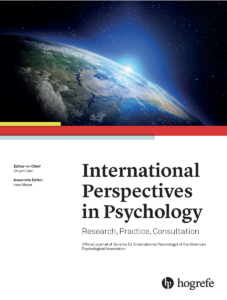
Stuart C. Carr, School of Psychology, Massey University, Aotearoa/New Zealand
Ines Meyer, School of Management Studies, University of Cape Town, South Africa
2021 is not only the start of a new year, it is also the start of a new publisher for International Perspectives in Psychology: Research, Practice, Consultation (IPP). We are delighted to be publishing with, and to be published by, Hogrefe. In our last Editorial of 2020, we focused on building back better (Carr & Meyer 2020). In this issue of IPP, by contrast, we focus on building forward better, through our new publishing partnership with Hogrefe publishers. Already for example, Hogrefe have just announced a very exciting and innovative development for the road ahead – Researchers from most of the relevant scientific and research institutions in Germany, a total of 113 institutions, will be able to publish their articles in Hogrefe journals open access from 2021 onwards, at no additional cost (Hogrefe, 2020). We therefore call on contributors across Germany, and more importantly your international colleagues and research partners, to consider submitting your international perspectives in psychology to IPP!
Speaking of international ethos, diversity and inclusion, this issue is incredibly diverse, not only in topics but also in the places from which, and in which, they are grounded. They span a range of methods, and approaches. They speak to a variety of interconnected goals and values espoused in the Journal’s ambit and ethos. They include a perspective from the creative arts on political change in Puerto Rico (Espada-Brignoni & Alfaro, 2021) and, in response to an earlier call for a special issue on Populism, para-social relationships with populist leaders across (and within) Indonesia, the United States and in New Zealand (Moh. Hakim & Liu, 2021). We have further articles on the psychology of shame, building more inclusive human services, among Pakistani immigrants in Canada (Collardeau, Bin Aftab, Jubeen, & Woodlin, 2021); and on the potential role of micro-nutrients in helping to combat traumatic stress following events like the Christchurch shootings and other natural and manmade disasters (Rucklidge et al, 2021). Lastly, we have a Policy Brief on how to streamline access to host country humanitarian services like healthcare for refugees from Syria in Turkey (Chen, 2021). Empowerment and change, mobility and recovery from disasters, and building forward into more inclusive human services – these are all hallmark themes in IPP and our home Division 52 – International Psychology (.https://www.apa.org/about/division/div52).
As we turn now to face forwards into 2021, we are very excited and humbled to be working together with Hogrefe to build forward better. Keep your eyes open for our forthcoming special issues across a range of topics, from decent work and Global changes in the world of work, on Women during COVID-19, and Psychology during the COVID-19 Pandemic . (https://www.hogrefe.com/us/journal/international-perspectives-in-psychology-research-practice-consultation). Above all, please do consider sending us your ideas for future special issues, and formats, and your research articles and policy briefs. Feel free to contact us directly on S.C.Carr@Massey.ac.nz and/or I.Meyer@uct.ac.za. We warmly welcome your innovative ideas and feedback on the contents of the journal, present and future, and look forward to building forward better with all of us during the new year ahead.
Past, Present, and Upcoming information for IPP can be found here: https://econtent.hogrefe.com/loi/ipp
References
Carr, S. C., & Meyer, I. (2020). Building back better with International Perspectives in Psychology. International Perspectives in Psychology: Research, Practice, Consultation, 9, 191-192.
Chen, E. C. (2021). Syrian refugee access to and quality of healthcare in Turkey: A call to streamline and simplify the process. International Perspectives in Psychology: Research, Practice, Consultation, in press.
Collardeau, F., Bin Aftab, M. U., Jibeen, T., & Woodin, E. (2021). Pakistani immigrants’ nuanced beliefs about shame and its regulation. International Perspectives in Psychology: Research, Practice, Consultation, in press.
Espada-Brignoni, T., & Alfaro, F. R. (2021). Culture, subjectivity, and music in Puerto Rico: Bomba, plena, and the ousting of a governor. International Perspectives in Psychology: Research, Practice, Consultation, in press.
Hogrefe. (2020). Press release: Hogrefe and SUB Göttingen pave the way to Open Access. Göttingen, Germany.
Moh. Hakim, & Liu, J. H. (2021). Development, construct validity, and measurement invariance of the para-social relationship with political figures (PSR-P) scale. International Perspectives in Psychology: Research, Practice, Consultation, in press.
Rucklidge, J. J., Afzali, M. U., Kaplan, B. J., Bhattacharya, O., Blampied, F. M., Mulder, R. T., & Blampied, N. M. (2021). Massacre, earthquake, flood: Translational science evidence that the use of micro-nutrients post-disaster reduces the risk of post-traumatic stress in survivors of disasters. International Perspectives in Psychology: Research, Practice, Consultation, in press.


Happy New Year to all Division 52 colleagues!
Across the globe we are ushering in the new year in various ways. For some, celebrations have already occurred alongside new resolutions and goals, while others are preparing for festivities with anticipation of the new moon cycle. The pandemic may have required us to modify traditional celebrations and gatherings, but we want to take this time to acknowledge and share in a collective spirit of newness, hope and blessings for a healthy and prosperous future!
We are excited to launch IPB into the new year with some updates and new sections:
1. We will be publishing IPB quarterly to align with the publishing of the International Perspectives in Psychology journal;
2. We will be adding a Historical Perspectives section, please send us any memories, perspectives, or dedications you have from your time in Division 52;
3. We added a Pilot Study Corner to highlight pilot studies and promising projects and provide Members an opportunity to put a call out to other Members and readers to develop research collaborations to expand upon the pilot study or promising project, or to launch a research initiative.
4. We are looking to publish pieces in languages other than English. We are looking to accomplish this goal in two ways: (1) Members submitting Global Perspectives in both English or another language and (2) Members working with their global partners to submit pieces in English and a second language for the Collaborative section of IPB.
5. A new Art & Poetry Corner will feature any creative art or poetry from our members. Please submit any works of art, including poems, photos of original art pieces you have created. Include with your submission the title of your piece, and a brief statement describing your piece.
6. As an editorial team we will be doing outreach to colleagues across the world to submit pieces to the IPB, we aim to highlight a different region with each issue. Any ideas please email!
7. We are looking to expand our team, if you have interest in joining our editorial team please email us. This may be of particular interest to student and ECP members.
Finally, we need you!!! As an editorial team we have been looking to increase the number of submissions for each issue that fit the Global Perspectives and Collaborative sections of IPB and now our new Pilot Study Corner. We encourage all of our colleagues in Division 52 to write about your amazing work you are doing globally with your partners. This is a great way to get your work (completed or in-progress) out here in preparation to submit to a journal like International Perspectives in Psychology. Below you will find an overview of our sections for the parameters of each section.
IPB Submission Guidelines
Please email us your submissions for our April issue, questions, or other ideas at ipbdiv52@gmail.com.
Best,
Steve and Joyce
Title – Movement: Follow Closely
Poem and illustration by Joyce Yip Green
*digital illustration created on iPad 
I long to dance with color outside
And feel the wind, following closely
The birds who seem unaware of where
It is taking them


